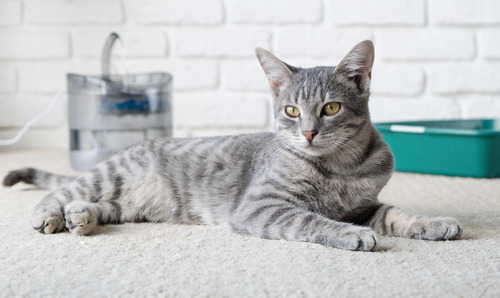If you’ve discovered your cat pooping outside the litter box, you’re not alone. This behavior is one of the most common reasons cat owners seek help from their veterinarian. While it can be frustrating, it’s important to know that your cat isn’t misbehaving on purpose. In fact, this behavior often signals that something is wrong, either physically, emotionally, or environmentally. For pet owners in Berthoud, CO, our team at Berthoud Animal Hospital is ready to help. If your cat is avoiding the litter box, call us today at (970) 532-2726 or book an appointment online so we can work with you to get them back on track.
Common Medical Reasons for a Cat Pooping Outside the Litter Box
When a cat suddenly starts pooping outside the litter box, medical issues are often the first possibility to consider. Cats instinctively want to use their litter box, so avoiding it may be their way of signaling pain or discomfort.
Gastrointestinal Issues
Digestive problems such as constipation, diarrhea, or inflammatory bowel disease may make it uncomfortable or difficult for your cat to use the litter box. If the litter box becomes associated with pain, your cat may start going elsewhere.
Urinary Tract or Kidney Concerns
While pooping outside the litter box is different from urinating outside of it, urinary discomfort can cause cats to feel unsettled and avoid their litter box altogether. Cats experiencing discomfort may mix up elimination behaviors.
Arthritis and Mobility Problems
Older cats with arthritis may find it difficult to climb into a litter box with high sides. Pain when stepping in and out can cause them to choose an easier spot, such as the floor or a soft rug.
Parasites or Infections
Intestinal parasites or infections may cause urgency, which can lead your cat to eliminate outside of the litter box simply because they cannot make it in time. If your cat is pooping outside the litter box frequently, it’s important to schedule a veterinary visit. At Berthoud Animal Hospital, we can perform a physical exam and diagnostics to determine whether a health issue may be the cause.
Environmental Triggers for Litter Box Avoidance
If medical issues are ruled out, the next most likely cause of a cat pooping outside the litter box is related to their environment. Cats are particular about their litter box setup, and even small changes can make a big difference.
Litter Box Cleanliness
Cats prefer a clean space. If the litter box isn’t scooped daily, your cat may seek out a cleaner spot. Since their sense of smell is far stronger than ours, even mild odors can deter them.
Location of the Litter Box
Placing a litter box in a noisy, busy, or hard-to-reach location may discourage your cat from using it. Cats prefer quiet, private areas where they feel safe. If the box is too close to food and water, this can also be a deterrent.
Litter Type and Texture
Cats can be picky about the type of litter used. Some dislike scented litter, while others may find certain textures uncomfortable on their paws. Experimenting with different litters can sometimes resolve the problem.
Number of Litter Boxes
The general rule is one litter box per cat, plus one extra. In multi-cat households, if there aren’t enough boxes, or if dominant cats guard access, others may be forced to eliminate outside the litter box.
Behavioral Causes of a Cat Pooping Outside the Litter Box
Even if your cat is healthy and the litter box setup seems fine, behavioral issues may still play a role. Cats are sensitive creatures, and stress or changes in their environment can influence bathroom habits.
Stress and Anxiety
Cats thrive on routine. A new pet, a move, or even changes in your schedule can cause stress, leading to a cat pooping outside the litter box. Stress can also manifest in other ways, such as hiding or aggression.
Territorial Behavior
Cats may poop outside the litter box as a way of marking territory. This is especially common in multi-cat households where social hierarchies are unclear.
Negative Associations with the Litter Box
If your cat experienced pain while using the litter box, they may associate it with discomfort and avoid it, even after the problem is resolved.
Boredom or Lack of Stimulation
In some cases, a lack of enrichment in the home can lead to stress behaviors, including inappropriate elimination. Cats need mental and physical stimulation to feel secure and balanced.
How to Address the Problem
While you should avoid in-home medical treatments without veterinary guidance, there are general steps that can support your cat once your vet has ruled out underlying issues.
Veterinary Guidance Comes First
Always begin with a veterinary exam to identify or rule out medical concerns. If your cat pooping outside the litter box has a medical cause, addressing it early will help prevent it from becoming a long-term habit.
Evaluate the Litter Box Setup
If health issues are not the cause, review the litter box environment:
- Scoop daily and change litter regularly.
- Try different types of litter to find one your cat prefers.
- Ensure boxes are in quiet, low-traffic areas.
- Add more litter boxes in multi-cat homes.
Reduce Stress in the Household
Consider ways to minimize stress, such as providing hiding spots, climbing trees, or interactive toys. A calm and enriched environment can reduce the likelihood of litter box issues.
When to Call Your Berthoud Veterinarian
If your cat pooping outside the litter box becomes frequent or persistent, don’t wait to seek help. Cats are experts at hiding discomfort, so bathroom changes may be one of the only signs something is wrong. At Berthoud Animal Hospital, our team can help determine the cause of your cat’s behavior and create a plan that works for your household. Whether it’s a medical condition or an environmental trigger, we’re here to support both you and your cat. Call us today at (970) 532-2726 or book an appointment online.





